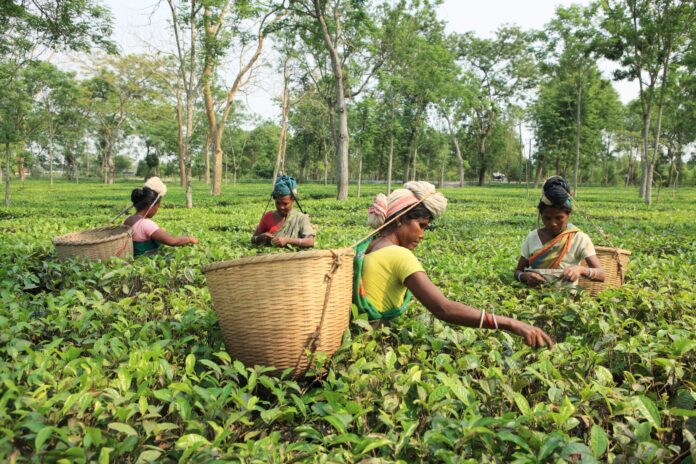In Assam, the Adivasi Students’ Association has declared a ban on Bharatiya Janata Party (BJP) workers in tea gardens. This decision came to light during a public protest meeting held at the Phulbari tea garden playground, where the association’s president, Pradip Nag, emphasized the necessity for the indigenous community to take a firm stand against political forces they perceive as detrimental to their interests.
The gathering drew a considerable crowd, showcasing the collective strength and unity of the Adivasi community in Assam. Pradip Nag, addressing the audience, expressed the urgent need for the Adivasi community to assert its identity and rights in the face of political challenges. He articulated concerns that the community feels marginalized under the current political regime and highlighted the importance of solidarity among indigenous groups to protect their culture, land, and livelihoods.
The declaration comes amid rising tensions between various communities in Assam and the ruling party. Many Adivasi individuals working in tea gardens have voiced their grievances regarding the lack of political representation and the perceived neglect of their issues. During the meeting, members of the association called for action and urged the community to reject any form of political manipulation that could undermine their rights. The ban on BJP workers signifies a broader demand for accountability and respect for the Adivasi community’s rights.
The Adivasi community has historically played a crucial role in Assam’s tea industry, contributing significantly to the state’s economy. However, many members of this community feel that their contributions have gone unrecognized, leading to feelings of discontent and disenfranchisement. The protest meeting served as a platform for individuals to voice their concerns and demand fair treatment from the government and political parties.
Nag underscored the importance of the tea gardens not just as workplaces but as integral parts of the community’s identity. He stressed that the future of the Adivasi people is closely tied to the tea industry, and any political decisions impacting this sector must consider their interests. The declaration to ban BJP workers indicates a growing sentiment that the community must take control of its narrative and ensure that its voices are heard in the political arena.
The Adivasi Students’ Association plans to organize more public meetings and awareness campaigns to educate the community about their rights and the political processes affecting their lives. The group aims to foster a sense of empowerment among Adivasi youth and encourage them to participate actively in politics. By mobilizing community members, they hope to create a stronger voice that demands respect and recognition.
Many attendees at the meeting expressed a desire for unity among different indigenous groups in Assam, suggesting that a collective approach could lead to more significant political leverage. The association emphasized that this movement is not solely about opposing the BJP but about advocating for the rights and welfare of the Adivasi community as a whole.
The declaration by the Adivasi Students’ Association has sparked discussions across Assam, with various political commentators analyzing its implications for the state’s political landscape. Some see this as a turning point for the Adivasi community, which has often been overlooked in mainstream political narratives. Others caution that the growing tensions could lead to further polarization among communities in Assam, emphasizing the need for dialogue and reconciliation.
In response to the declaration, BJP leaders in Assam have stated that they respect the democratic right to protest but have urged the Adivasi community to engage in constructive dialogue rather than adopting an adversarial stance. They argue that the party has made significant efforts to address the concerns of various communities in Assam, including the Adivasis.
As Assam navigates its complex socio-political landscape, the actions of the Adivasi Students’ Association highlight the importance of grassroots movements in shaping the future of the region. The call for unity and collective action among indigenous communities resonates deeply, reminding all stakeholders that the voices of the marginalized must not be ignored in the political discourse. The Adivasi community’s fight for recognition and rights will undoubtedly continue to evolve, and how the political landscape responds will be crucial in determining the future of Assam’s diverse communities.




